The Greek elections taking place on Sunday 25th January come at a crucial time for the country as it considers the path it will take following the tough times of the past decade.
Here are the key characters who could be making those decisions once the votes have been counted:
Evangelos Venizelos
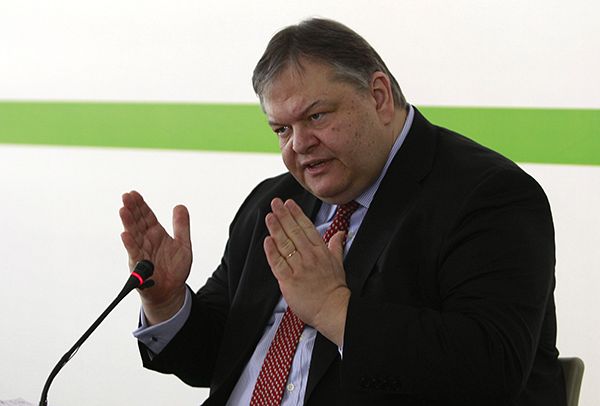
Venizelos was born in 1957 in Thessaloniki. Before entering politics, he was a professor of Constitutional Law at the Aristotle University of Thessaloniki. His first term as an MP dates back to 1993 and he has since held many government and party positions.
Most recently, he was appointed finance minister in 2011, with the extremely difficult task of negotiating a second loan with the International Monetary Fund, the European Union and the European Central Bank.
In March 2012 he was elected, as sole candidate, PASOK’s president to lead the party into this year’s elections.
After DIMAR left the tri-party coalition government, Venizelos was appointed government vice president and minister of foreign affairs.
Giorgos Papandreou
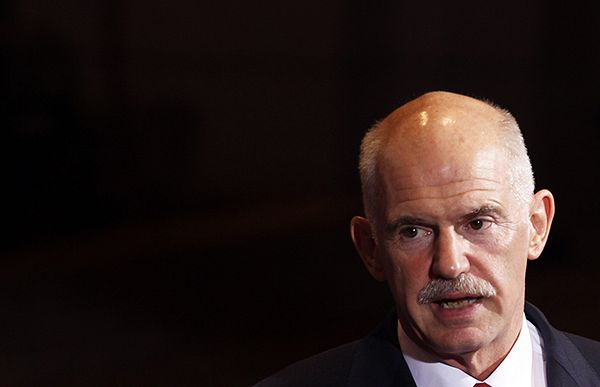
Former prime minster Papandreou is the son of PASOK founder Andreas Papandreou, who established PASOK as a leading social-democratic European force. His grandfather by the same name was one of Greece’s most celebrated politicians.
Papandreou served as a minister since 1986, in 2004 he assumed presidency of PASOK and became prime minister in 2009.
He stepped down both from being a prime minister and a PASOK president in 2011, after he suggested that a referendum be held to approve the second Greek bailout program. He remained a PASOK MP, but didn’t miss the chance to criticise his successor’s decisions.
On January 3rd 2015 Papandreou announced his split from PASOK and the launch of his “Movement of Democratic Socialists” (“KIDISO”). His move brought a wave of criticism from Evangelos Venizelos and other PASOK officials, because it was seen as a split in the centre-left.
Along with that, Papandreou was also heavily scrutinized for mismanaging the crisis in 2010 and failing to negotiate softer terms in a bailout deal for Greece. It is mainly as a result of this fallout that the polls predict that his KIDISO won’t make the 3% threshold to elect MPs.
Nikos Mihaloliakos
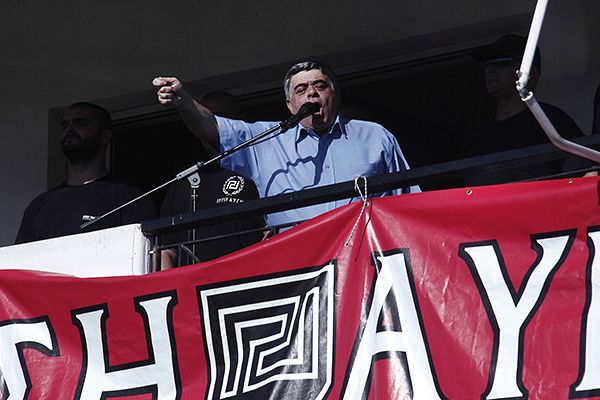
Never before has a party in Greece participated in elections, while its leader was in jail. However Mihaloliakos, sec. gen. of extreme right party Golden Dawn, has changed that.
Mihaloliakos launched Golden Dawn as an organisation in 1980, offering a platform for supporters of the military junta that ruled Greece between 1967 and 1974 and also to neonazis. The party was founded in 1993, but only in 2012 did it get to elect MP’s (18, 6,92%), by appealing to the Greek voters’ anger over corruption scandals, illegal emigration and high unemployment.
In September 2013 a Greek antifascist rapper was stabbed to death by Golden Dawn members. Mihaloliakos was charged as a leader of a criminal organization and incarcerated, along with top GD officials and MPs.
Fotis Kouvelis
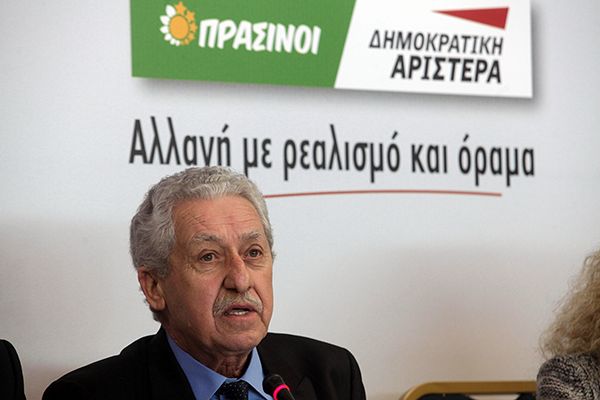
1948 Kouvelis is the only active leftwing MP to have ever held a government office. The leader of the Democratic Left (DIMAR) was appointed justice minister in 1989 in a coalition government.
Kouvelis studied Law and in 2008 he was candidate for SYRIZA’s presidency against Tsipras. Leader of SYRIZA’s revisionist wing, he announced in June 2010 that he was leaving the party in protest over what he saw as a shift to the extreme left. A month later he was elected president of the newly founded party Democratic Left.
He participated in the 2012 coalition government, but left after ERT’s shutdown a year later. After leaving the government, DIMAR faced intense internal turmoil, with the party’s MPs suggesting its leader step down. Despite that, Kouvelis was reelected president. However the party’s results in the polls suggest that DIMAR will not make it to the 3% threshold. Facing parliamentary exclusion, DIMAR has joined forces with the Greens ahead of the January 25th snap elections.
Dimitris Koutsoumpas
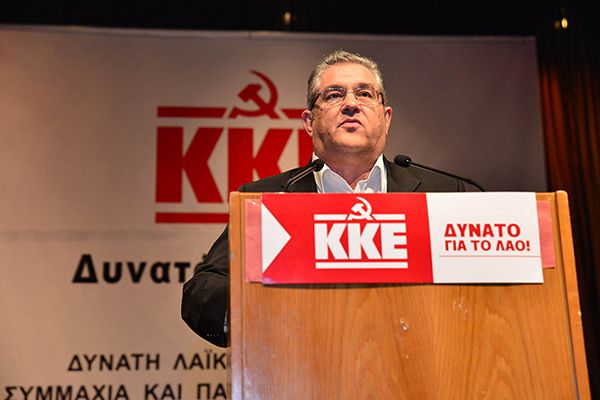
Born in 1955, Koutsoumpas is taking part in national elections for the first time in his political career. He studied Law and has held many posts within the Greek Communist Party, with the most notable being director of the party’s official newspaper for a decade.
He was elected secretary general in April 2013, succeeding Aleka Papariga, the first woman to ever head a major political party in Greece. Papariga was KKE’s sec. gen. from 1991 to 2013.
Stavros Theodorakis
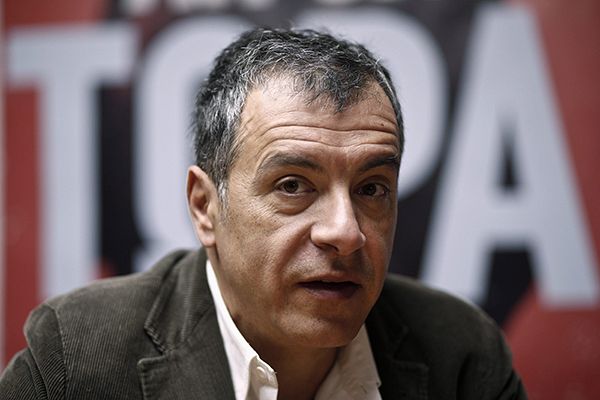
Before engaging with politics and founding his River party (“To Potami”), Theodorakis was a famous TV journalist. His show “The Protagonists” ran on high ratings, but in February 2014 he announced that he was quitting his job to launch his party.
To Potami’s first election run was in 2014’s European elections. Two candidates were elected and they joined the S&D group in the European Parliament.
Despite the party’s appeal on voters of the centre left, To Potami’s electoral lists for the January elections will also feature candidates from the liberal party “Drasi” (“Action”).
Panos Kammenos
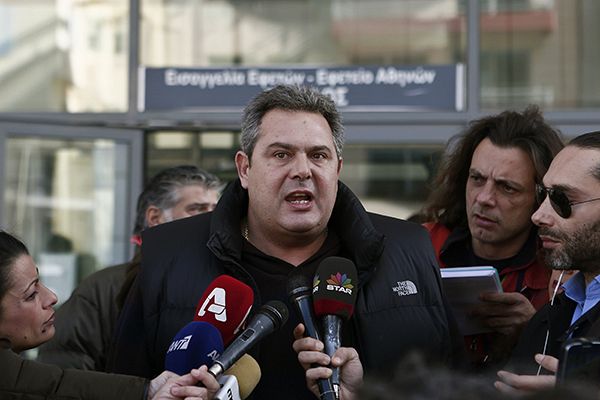
A former ND MP, Kammenos founded his own party Independent Greeks (“ANEL”) in February 2012. He left New Democracy after objecting to the austerity measures being imposed on Greece.
Before launching his party, Kammenos held the office of the deputy minister of mercantile marine in 2007. He was born in 1965, first elected in 1993 and has studied economics and psychology. His opponents often criticise him for drawing on conspiracy theories and populism that appeals on a growing anti-german feeling of his constituents, yet he managed to elect 20 MPs in the 2012 elections (7,51%).
Giorgos Karatzaferis
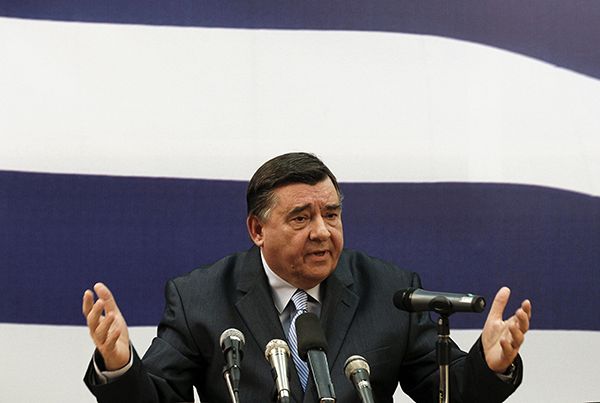
Although Karatzaferis had showed an early interest in journalism and media in general, it was politics that finally won him over. Nevertheless he still owns a television station, a radio station and a newspaper. His journalistic training is obvious in the eloquence of his public speaking.
Karatzaferis was elected for the first time in 1993 under ND’s flag. He was unofficially a member of the party’s far right wing and in 1998 he even called for collaboration with Golden Dawn members and royalists, in order for ND to be elected.
In 2000 he was kicked out of ND and launched his own party “LAOS” (“Popular Orthodox Rally”). He didn’t enter parliament until 2007, but he was elected in the 2004 European Elections. His party contributed to the 2012 Papadimos government, but in this year’s elections, hobbled by the defection of MPs, didn’t make the 3% threshold.
Politically speaking, Karatzaferis places himself in the popular right, whereas his ethnocentric speech places him in the far right section of the Greek political landscape. He has often revealed his xenophobic opinions, blaming the Zion Protocols or the Bilderberg Group for adverse international events.
In late 2014 Karatzaferis was linked to a return to ND. However, early 2015 saw him being prosecuted for not declaring the money he had received from an offshore company in connection with a state purchase of Super Puma helicopters. Karatzaferis denies all allegations.











